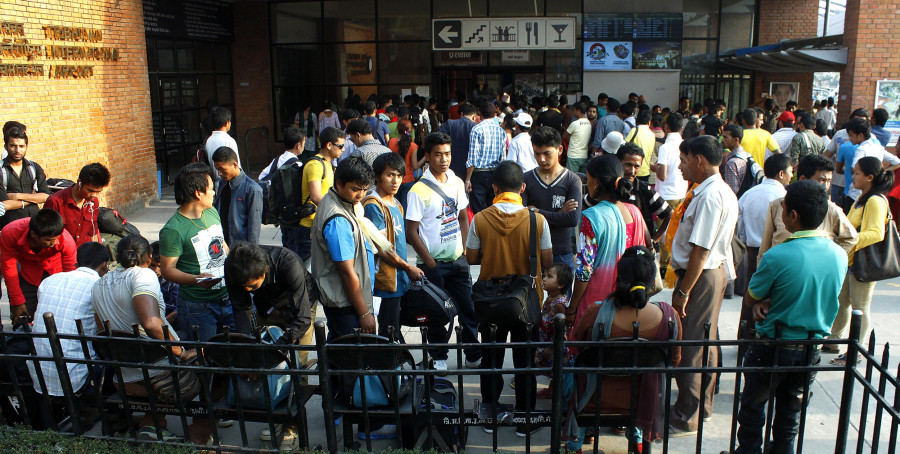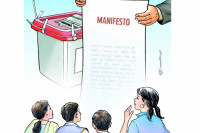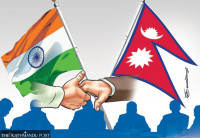National
Nepali migrant workers continue to dole out hefty amounts for overseas jobs
Even years after the government rolled out its ‘free visa and free ticket’ policy, majority of workers are not benefiting from these measures.
Chandan Kumar Mandal
Sunil from southern Nepal moved to the United Arab Emirates in March, just before Nepal went into a complete lockdown for the next four months.
He faced financial problems right from his first month in the Gulf state due to the Covid-19 pandemic. His employer deducted 300 dirhams from the monthly salary of 1,000 dirhams.
“Even months after the pandemic, I am only paid when there is work. On days I don’t have work, I stay in my room,” said Sunil. “There is not much to do.”
Sunil is worried that his income won’t be enough to repay the Rs130,000 loan he took to pay his agents for the job in Dubai. He had left the country only a few months after Nepal the UAE signed an understanding to provide “zero-cost” jobs to Nepali workers. But the provision, which was supposed to make foreign employment more accessible for Nepali workers, is not being implemented well.
This is reflected in grievances filed by migrant workers at the Department of Foreign Employment, the central body overseeing the foreign employment sector.
According to Kumar Prasad Dahal, director general at the department, more than 75 percent of the complaints his office receives are related to workers being overcharged for jobs in the Persian Gulf countries, Malaysia and Europe.
“The department has found that Nepali workers have paid from Rs130,000 to Rs700,000 for jobs in the Gulf and Malaysia,” said Dahal, during a virtual interaction organised to mark the “International Migrants Day”.
“For European jobs, workers are not charged less than Rs700,000.”
During the event, organised by Labour Employment Journalist Group, participants agreed that fair and ethical recruitment practices are far from being implemented while hiring Nepali workers despite stakeholders’ commitments.
“The general understanding is that fair recruitment means only free visa and free ticket. But fair recruitment means ensuring workers rights during all phases of the hiring process. Recruitment is just one of the aspects of the practice,” said Neha Choudhary, national project coordinator at Integrated Programme on Fair Recruitment, ILO Nepal.
“There are labour agreements with countries like Jordan, Malaysia, Mauritius and the UAE, which promote zero cost jobs. Also, there are regional and international obligations for ensuring fair recruitment,” added Choudhary. “Despite having policies in place, we lag in implementing fair recruitment during the hiring of Nepali workers.”
As per the general principles and operational guidelines for fair recruitment of the International Labour Organisation no recruitment fees or related costs, including airfare, should be charged to, or otherwise borne by, workers or job seekers and governments should take measures to eliminate the charging of recruitment fees and related costs to workers.
However, there are hundreds of instances of workers paying several thousand rupees to sub-agents and recruiting agencies even though the government has enforced the “free visa and free ticket” policy and signed agreements that promised zero investment on the part of workers.
Recruiting agencies continue to express their dissatisfaction over free visa and free ticket policy and fair recruitment practices.
“Fair recruitment practices come with several challenges. Agencies are private enterprises and in the business to make money,” said Sujeet Kumar Shrestha, general secretary of Nepal Association of Foreign Employment Agencies (NAFEA), a grouping of recruiting agencies hiring and supplying Nepali migrant workers to foreign employers.
“Recruiting agencies have already been dealing with high guarantee amount, bank loans, staffs expenses and office operation expenses,” said Shrestha. “It costs around Rs27,000 to get demand for one worker. The ceiling of Rs10,000 fixed by the government under the free visa and free ticket scheme is not even enough for office expenses.”
Shrestha also warned that enforcing fair recruitment practices and making employers pay might result in a drop in demand for Nepali workers as there are several labour source countries competing with Nepal.
“When the government signed labour agreements like the one with Malaysia, agencies were not consulted. It was signed and imposed on agencies for cheap popularity. Demand for Nepali workers in Malaysia has dropped since the labour deal, ” said Shrestha. “The government can not implement it by bypassing recruiting agencies. Even the government has not followed the principle as workers going to South Korea and Israel under the new deal will be paying for their jobs.”
Recruiting agencies said the fair recruitment practices, without having workers pay for jobs, can be acceptable for them if agencies are offered an amount equivalent to the a month’s salary of workers and air tickets are bought by workers.
Nepali Ambassador to Malaysia Uday Raj Pandey refuted claims by the recruiting agencies that demand for Nepali workers in Malaysia has nosedived and employers are not ready to foot recruitment fees and other related costs on behalf of workers.
According to Pandey, the embassy in Malaysia has approved demand for over 63,000 Nepali workers in the last six months.
“Data on workers’ demand does not show demand has gone down. Even during the normal times, there would be demand for around 100,000 workers in a year, said Pandey. “Most of the demand applications were approved as per the provisions of the labour deal. Employers are ready to abide by the agreement and also provide service charge to recruiting agencies in Nepal under the agreement.”
The Department of Foreign Employment has inspected over five dozen recruiting agencies and suspended operations of 45 in the last three months, showing the labour migration sector plagued with fraud and exploitations.
“Foreign employment is not about profit and loss as recruiting agencies might say. Our prime concern is workers’ rights safety. If the policies are in place, then it has to be followed.” said Dahal.
“The government has not enforced any criteria regarding their office operation, which increases their business expenses. The Rs10,000 ceiling can be reconsidered and updated. But, 99 percent of the time fair recruitment is not followed.”
In Dubai, Sunil is waiting for normality to return so that he gets to see his first regular paycheque.
“If work resumes, and I get regular payment, it would still take me at least six months to repay my loans.”




 13.12°C Kathmandu
13.12°C Kathmandu















